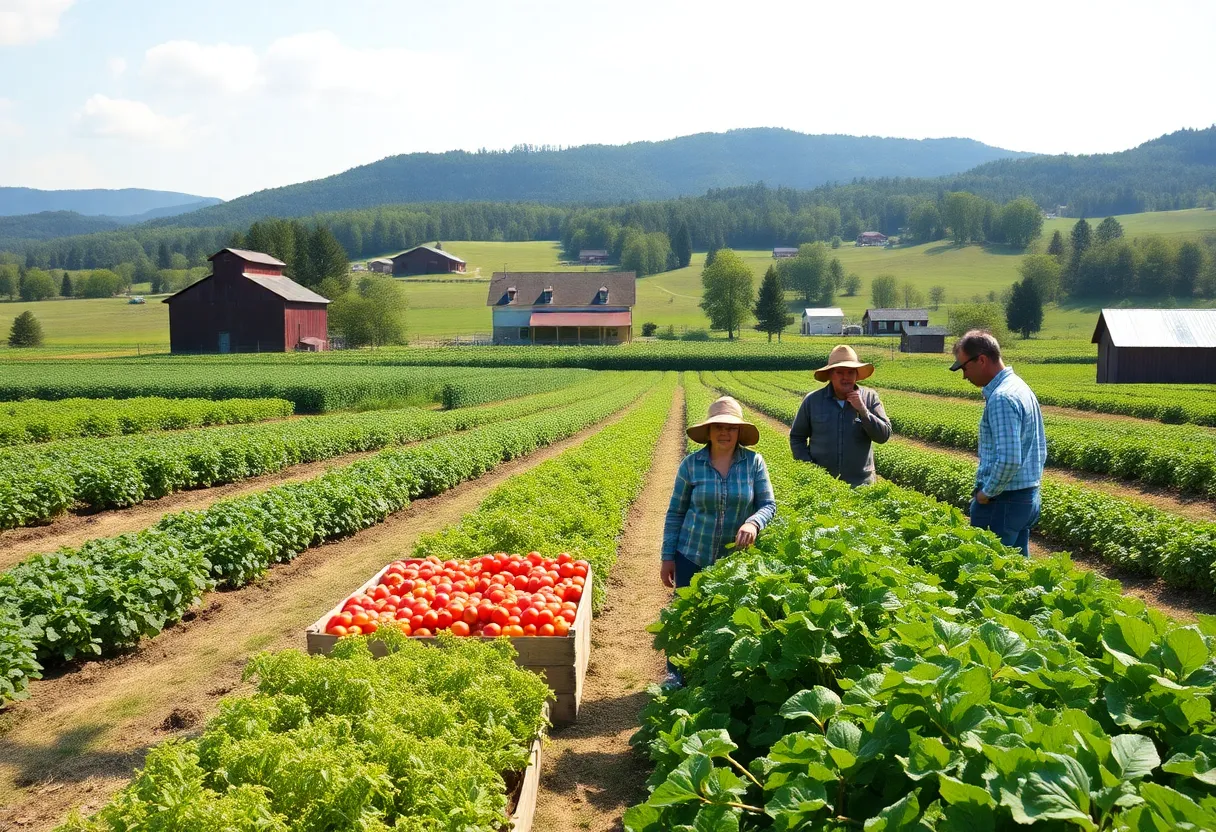News Summary
In Barnardsville, Western North Carolina, family farms like Ivy Creek are thriving through community support and collaboration. As the local food movement gains momentum, farmers are uniting to support new entrants and foster sustainable practices. With fertile lands and vibrant markets, the agricultural landscape is evolving, showcasing diverse crops and establishing vital connections among farmers and consumers alike.
Farming Flourishes in Western North Carolina: A Story of Community and Collaboration
In the scenic surroundings of Barnardsville, a farming revolution is taking root. Here, family farms like Ivy Creek are weaving a beautiful tapestry of community support and dedication that’s leaving an indelible mark on Western North Carolina’s agricultural landscape. As farmers navigate the challenges of cultivating life amid rolling hills and vibrant markets, they are finding strength in unity and education.
Ivy Creek Family Farm: A Model of Collaboration
Located in a mountainous region, Ivy Creek Family Farm often has to lease additional land to sustain its crop rotation. The owners, Paul and Anna Littman, know firsthand that farming is much more than just planting seeds and harvesting crops. It’s about building reinforcing ties with the community. In this spirit, the farm not only caters to its needs but extends its hand to new farmers, helping them thrive.
Jacob Gigler-Caro exemplifies this notion, currently taking on the role of an advanced apprentice at the farm. Learning the tricks of the trade, he is gaining invaluable experience and absorbing the rich knowledge passed down through traditional practices while also embracing modern sustainable techniques.
A Thriving Farming Landscape
Western North Carolina is blessed with fertile farmland that nourishes a diverse agricultural ecosystem. Vibrant farmers markets sprout across the region, showcasing everything from heirloom tomatoes and grass-fed beef to a colorful array of seasonal vegetables. The local food movement is more than just a trend—it’s a lifestyle embraced by many. Chefs in the thriving city centers of Asheville and Boone are on the lookout for niche ingredients, prompting farmers to grow unique goodies, including specialty herbs and even edible flowers.
Supporting New Farmers
Mentorship is alive and well in this community. Veteran farmers, such as Tom Elmore, are reaching out to help newcomers like Gwen Casebeer and Jay Englebach at Black Trumpet Farm. Programs such as CRAFT (Collaborative Regional Alliance for Farmer Training) are fostering collaboration and offering a platform for new farmers to exchange ideas and strategies.
Education as a Cornerstone
Education is key to the sustainability of farming in this area. The Organic Growers School offers structured programs like Farm Beginnings to assist aspiring farmers in navigating the complexities of starting a farm. By encouraging knowledge-sharing and collaboration, these programs create a sense of belonging and resilience among farmers.
Community Connections Matter
Farmers markets play a significant role in this ecosystem, serving not only as a source of fresh produce but also as a vibrant hub for networking among local farmers. They offer an excellent opportunity for farmers to meet, share experiences, and build relationships. Community farming events reflect the spirit of unity that drives this thriving agricultural scene. Consumers are urged to participate and support this local movement by shopping directly from these markets, fostering a deeper connection between the farmers and the community they serve.
Looking Ahead
While challenges remain, including rising land prices and extreme weather conditions, the spirit of collaboration and education nurtures hope and opportunity in Western North Carolina’s farming community. With new initiatives and steadfast mentorship, the future seems bright for both seasoned growers and newcomers embracing the call to the land.
As the local food movement continues to gain momentum, the vibrancy of Western North Carolina’s agriculture remains a shining example of hearts and hands working together to cultivate not just crops, but camaraderie.
Deeper Dive: News & Info About This Topic
HERE Resources
Raleigh Rallies Together for Farmers Affected by Hurricane Helene
Asheville’s Local Food Scene Flourishes with Digital: ASAP’s 2024–25 Local Food Guide
Additional Resources
- WNC Magazine: Growing Farmers
- Wikipedia: Agriculture
- WNC Magazine: Sustainable Agriculture
- Google Search: Local Food Movement
- WNC Magazine: Community Supported Agriculture
- Google Scholar: Community Support in Agriculture
- WNC Magazine: Organic Growing
- Encyclopedia Britannica: Sustainable Farming
- WNC Magazine: Farming in Appalachia
- Google News: Farming News North Carolina







